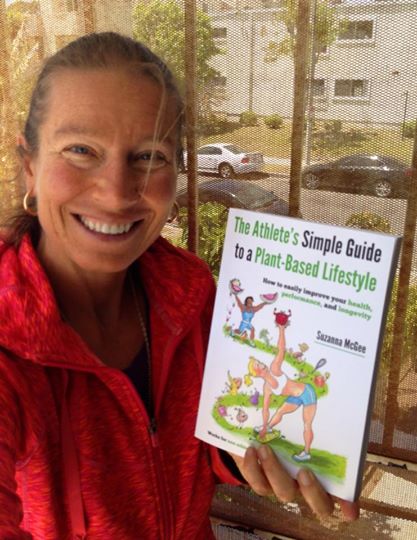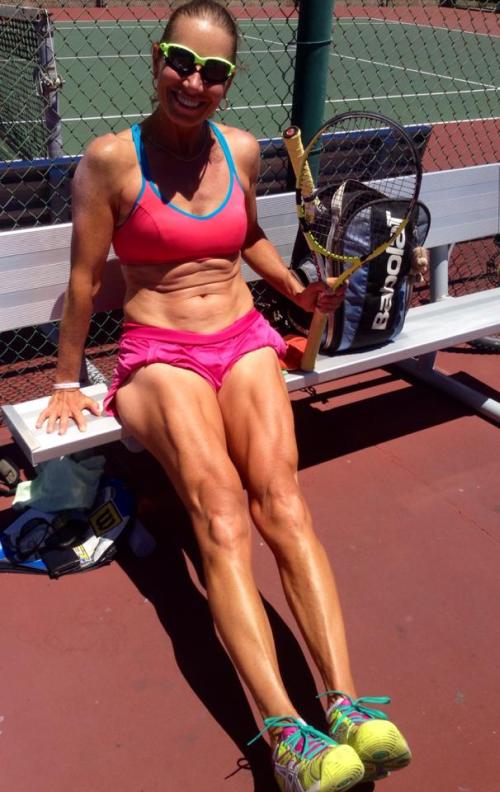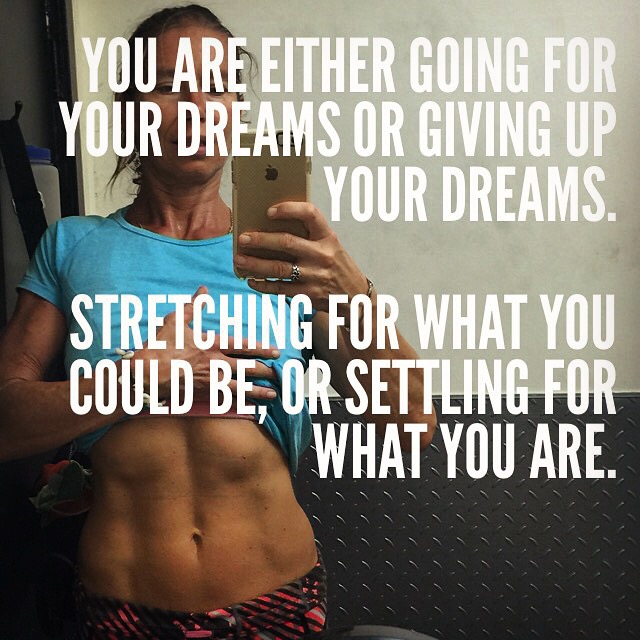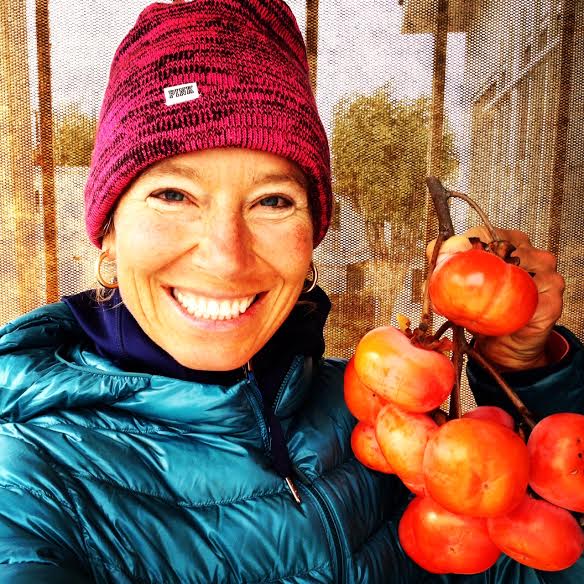Just a few days ago, I have been interviewed by this amazing lady, Michele Martinez, at www.TheFruitDoctor.com.
Some questions may be a little bit more toward the fitness and physique builders and competitors, but any person, athlete or non-athlete can benefit from the information. I thought I would share it with you, my sweet subscribers, as well. Enjoy.
I love profiling people who break the mold, and Suzanna McGee definitely does that. As you can see from her photos, she has a sizable amount of lean muscle mass and she’s raw vegan and only gets about 10–15% of her calories from protein. Those of you who are interested in adding healthy lean muscle and lowering body fat will find her interview to be very enlightening:
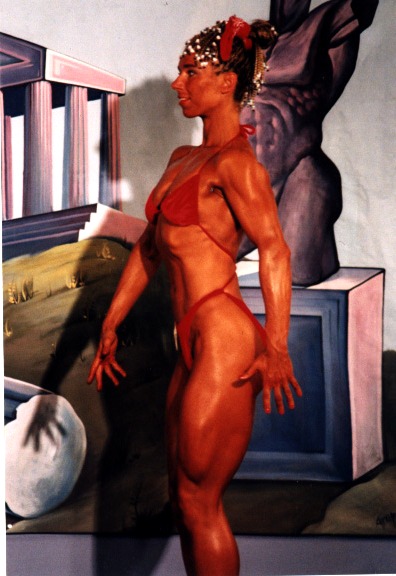
1) You are a former Ms. Natural Olympia bodybuilder. If you were to train for a contest today, what would your meals look like (give us a typical day). How many grams of protein? Any protein powders that you would take? How do you feel about fruit?
I would eat 2—3 smaller meals with 2—3 even smaller snacks. My first meal in the day is often freshly squeezed juice or a smoothie. I feel like it gives me a great start and a lot of energy for training. After my training (which is around lunch time) I would eat the biggest meal of the day. Often it is a HUGE homemade salad (huge = several pounds :-) ) of different veggies, sprouted grains, and definitely a great amount of sprouted legumes. Sprouted lentils are my favorite, because they are so easy to sprout and to digest. Later in the day, I would have another smoothie, and for dinner a light salad, or a freshly squeezed juice, depending how light I want to feel. A juice makes the body feel so light, because the body doesn’t need to spend any energy on digesting.
If I add some other protein than sprouted legumes to my meals, I use hemp or pumpkin protein. Hemp is a great quality protein and pumpkin seed protein has very neutral taste, so it can be added to anything. Green leafy vegetables, chlorella, and spirulina have a lot of protein, too, and adding small amounts here and there will add on during the entire day. I eat much less protein now than I used to when I was doing bodybuilding back in time, as a meat eater. I didn’t know better then. At 160 lbs, I eat about 80—120 grams of protein a day. Because I eat sufficient amounts of healthy carbohydrates, my body uses them for energy instead of protein.
I think fruit is very important, because it is full of carotenoids, flavonoids, antioxidants, fibers, minerals, and vitamins. Athletes who want to get lean often shy away from fruits because they fear the sugar/fructose. However, the amount of fructose in a piece of fruit is so small, about 4—5 grams, and maybe around 100 calories. Often the fruit is also low-glycemic. However, everybody’s body works differently, so we need to figure out for ourselves what works best. I wouldn’t shy away from the fruit. Especially in the morning for the energy and after the workout for the recovery. Maybe we can be more careful in the evening and not to eat too many fruits then.
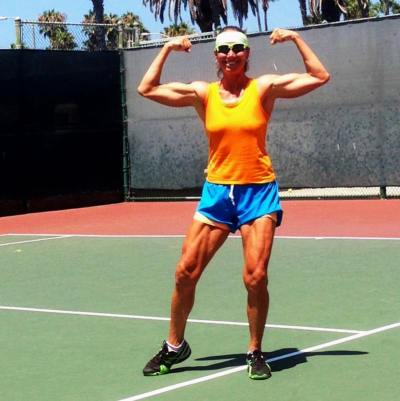
2) What do you eat in a typical day? For example, what do you put in your smoothies, what type of juice, what type of sprouted legumes, graines, etc What quantity of those do you add to your salad (for example, one cup) ? Do you count calories? How many calories? What percentage of fat do you eat? Protein?
I eat about 2,500–3,500 calories a day. If I want to lean out or remain very lean, I am keeping it close to the 2,500 range. I eat 3 main meals and if I am hungry in between, I snack on fruits or nuts. In my breakfast smoothie, I always put something green (spinach, kale, chard… about 100 grams… yes, I love to measure in grams because it is so much more precise than cups/spoons. I just run everything through a scale), one banana or mango, some superfoods such as spirulina, maca, or chlorella, and some seeds such as flax seeds or chia seeds. Each smoothie is different depending what’s in it. It is about 500–600 calories.
In my salads (any possible vegetable mix that you can imagine), I also add about 150 grams of sprouted lentils (these are my favorites, but sometimes I use mung beans or other sprouted legumes), some nuts or seeds, sometimes an avocado, sometimes a few pieces of fresh or dried fruit and spices. I like to always have all five flavors combined.
My protein intake is 10–15% from calories. I try to keep fat at 10–20%, but that is sometimes hard if I have too many nuts or avocados. Closer toward the 10% would be more beneficial for the heart health, but as an athlete, sometimes it is hard to achieve to stay this low for longer periods. So I just let it naturally fluctuate.
3) I’ve never heard of pumpkin protein. Is that a powder? Where do you get it?
Yes, it is a powder, made from pumpkin seeds. I get it on Amazon, as it is my favorite place to shop. But I would guess that any health food store would have it as well.
Do you ever eat high-glycemic fruits like bananas, mangoes, and dates? Or would you recommend that those trying to get lean for a contest avoid those and stick to berries and stone fruits?
I add a banana or mango into my smoothie in the morning or at a lunch time. Occasionally I snack on dates too, but try not to do it too often, because I have problems with moderation and I cannot eat just one… one turns into many, and then it is a bit too much sugar in one sitting. Unless the person has serious problems to get lean, then I would still have that one banana or mango in the morning meal, mixed with other veggies. The glycemic load is not as large when mixed together with other things.
4) We know The China Study correlates animal protein consumption with cancer. I have two books written by bodybuilders, Bob Delmonteque and Negrita Jayde, who both passed away from brain cancer at age 85 and cervical cancer at age 51 respectively. I then found a huge list of other bodybuilders who died young mostly from heart attacks but many from cancer and kidney failure. The video attributes this to the steroids (I know you are a passionate advocate of natural bodybuilding) so do you agree with that conclusion or do you feel that the bodybuilding high-protein diet plays a bigger part than they realize given what we know about saturated fat and heart disease?
I believe that the high animal protein diets play a very significant roll in the heart disease issues. Often these issues don’t show until much later in life, when the athletes don’t compete anymore, so they may not make the connection. But the abuse of the precious endothelial cells in the arteries starts already at young age, and happens with every animal meal ingested.
5) What salad dressings do you usually use on top of your salads (do you ever eat salt)?
I generally don’t use any dressing, because I am too lazy to make them :-) however, I just put a little bit pepper, salt, and Stevia on my salad and pour over the apple cider vinegar. That’s my healthy vinaigrette. I could, of course, pre-mix it ahead of time, and even add different herbs or spices for different flavors, but as I said, I always do this simple one and add different plants and spices into my salads.
6) Would you do anything different the last week before the contest? The last couple of days? If not, why not? If so, what and why?
I would decrease my carbohydrates to get the harder look. Because the fat is low too, then it would be more protein in my diet. The last couple of days, I’d drink a lot of water, more than before, just to make the body to flush out all the water out of the system. Then the night before the contest (and this is different for everybody, we have to find out the timing what works the best), stop drinking water, the body will still continue to flush it out, so we get that nice hard look. Then eat some carbs and/or fat to fill out a bit more (the fat/carbs get stored in intramuscularly), but definitely no water at this time or you would get bloated and get the unpleasant washed out look.
7) If you were training someone for a bodybuilding contest, how much of a calorie deficit would you put them on for cutting for a contest and when would you start the deficit (how many weeks out). Or do you not believe in counting calories while on a plant-based diet?
I definitely believe in counting calories! To this day, I have a log of my food intake, even though I don’t compete anymore. I think it is important for any serious athlete to know what and how much they eat. Even on a plant-based diet it is possible to eat too much, especially when adding too many nuts, seeds, avocados, etc. I love to eat and I get quite excited about the nuts, so I really need to keep a food log to keep an eye on myself :-)
It depends on the competitor, how much fat do they need to lose, but a good start is to cut down 300–500 calories a day, 3–4 months before the contest, and if that is not enough, then add some extra cardio too.
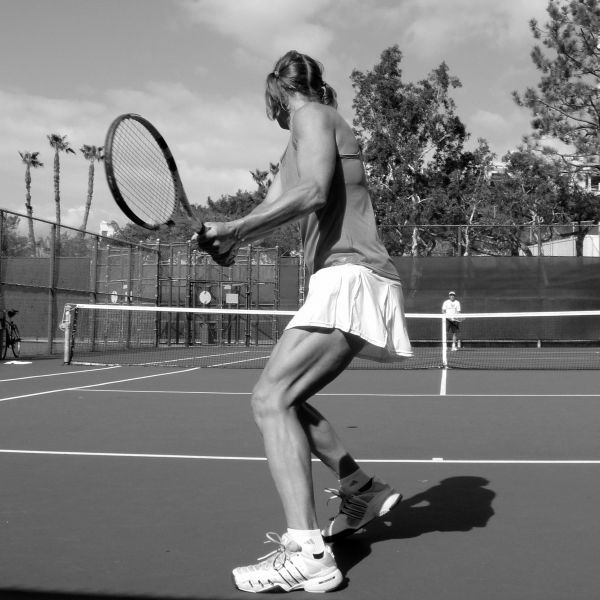
8) You specialize in sports injury prevention. How have you noticed that a plant-based diet figures into this? What have you noticed with regards to your recovery and injuries since you’ve been plant-based?
A plant-based diet is definitely very anti-inflammatory. I have noticed shorter recovery times, less soreness after training, more energy during training, and a deeper sleep, which aids to recovery as well—sleeping is the time when our bodies do all the healing. Also, I feel more in “peace” during the day, and more focused, which helps especially during the training, because I feel like being in the zone. My energy levels are stable during the entire day without the energy slumps after lunch for example.
9) You mentioned giving up greek yogurt was hard. Did you find a replacement that helped you to transition? If so, what is it?
Greek yogurt was the hardest for me, because I was eating it daily, a pound or more sometimes. I put it in my smoothies, or made an “ice cream” out of it (healthy ice cream that is: frozen berries with a bit of Stevia, walnuts, and yogurt). I was missing the flavor and texture at first, but I created my own flavor replacement: I use thick coconut milk in which I add a little bit lemon juice. It tastes sour-ish, just like the Greek yogurt. I use it for my smoothies and “ice creams” and it tastes delicious. After using my concoction for a while, I noticed that I didn’t crave the Greek yogurt as much as before, and I broke my addiction J
10) What’s the best way to lose body fat? To build muscle? Can you answer the “protein” question that plaques bodybuilders on the traditional high-protein diet?
I believe that building muscles and losing body fat go hand in hand. I am not a believer of too much cardio (even though I play tennis a lot, I don’t do it for the fat-burning benefits, rather for competitive reasons). I think the best way to burn off great amounts of body fat is to build a lot of solid muscle mass, which will eventually burn even more fat. I feel like doing tons of lunges of any form, squats, kettlebell swings, and similar activities burns a lot of calories and have similar effects like doing cardio, but you stimulate the muscle growth at the same time.
The protein myth is still so spread out among athletes. We think we need much more than we actually need. For a normal (non-muscle-building) athlete, 0.36—0.45 grams per pound of body mass is just fine. For a muscle growing athlete, 0.6—0.9 grams per pound of bodyweight is sufficient. In the early stages of bodybuilding, because the athletes grows much faster, up to 1.1 grams per pound can be eaten. These numbers are much smaller than a “traditional” view is, which could be up to 2—3 grams of protein per pound of body mass. If the athlete eats enough of good quality carbohydrates, all the ingested protein can be used on repair and muscle growth.
11) Do any of your former bodybuilding peers have any health issues related to their high-protein diet? What changes besides your lower cholesterol did you notice when you went plant-based? How did it affect your energy levels? Digestion? Recovery?
One thing was very striking to me just recently, when I met many of my former bodybuilding friends after a while of not seeing them: it seems like they have aged much faster than I did. I think that this plant-based diet recovers the body really well and takes a good care of the damaging antioxidants. Some of my former peers have kidney problems at a quite young age, a high cholesterol, and blood pressure, and just plainly look “worn out.”
The biggest changes to notice were the constant supply of stable energy, no up and downs. When I went raw, it was even more obvious. I wake up early, full of energy. I have great energy and stamina during my training. And I have good and stable energy for the rest of the day. I sleep soundly and deeply. I feel like I recover fast. My skin feels really tight, sort of young (and I am almost 50 years old), and the white in my eyes got really clean and white. It sounds almost too good to be true, doesn’t it? Once people figure this out, there will be many more plant-based athletes out there!
12) I didn’t know you were raw vegan; why raw? (I am too, but I want others to hear it from you and that it can be done) What changes have you seen from being raw vegan versus cooked?
I tried a couple of raw days a few years ago, but didn’t enjoy the experience because I am not (or I thought I was not) a “salad girl.” It felt like I didn’t have too many options to eat. I missed my cooked oatmeal and all the soups and stews that I liked to cook. Then last year I got a book from Ann Wigmore (the raw, living foods Queen, the founder of the Hippocrates Institute) and she had a few recipes in it. They were strikingly simple. A lot of sprouted legumes, and everything was quick to make. I thought to myself “I could handle this” and I gave myself a New Year resolution: to try raw vegan for a month. It turned out that after I got adjusted, I just loved the experience and remained raw ever since. The body feels just absolutely amazing when eating raw, living foods.
13) What would you like to see for the future of bodybuilding with regards to a plant-based diet?
When I look at all the bodybuilders in the gym and how hard they work to achieve the great look, I feel a bit sorry at the same time, because they are destroying their health slowly. Often without knowing. Bodybuilding takes such discipline and to me now, it feels like a waste of energy to work so hard to make oneself sick in a long term. I would like to increase the awareness of how great it feels to eat plants. How light the body feels, the amounts of energy, the quick recovery… If more trainees were aware of it, they would most probably love to become plant-based as well. Maybe, when there is more and more plant-based athletes, the knowledge will spread faster. I am hoping that my book will help this cause, too.
14) You mentioned that you have been able to inspire a lot of your students to go plant-based. What specifically do you feel has helped to inspire them to make the change that you would recommend other people do to help inspire loved ones in their lives?
I am very enthusiastic about things that I believe are great. I just don’t stop talking about it. Ha, ha, I also must be very irritating with going on and on, but my friends and clients who know me, they just accept me and sooner or later, I convince them to at least try. Once I have them to try, I know I will get them completely :-) I love to read and educate myself continuously, so every new knowledge that I learn, I pass on my students. So when they hear new interesting stuff all the time, they eventually get interested as well. And of course, me being a fit and healthy proof of my theories is a great inspiration for them, too. I pay attention to remaining super fit, physically and mentally, so I can lead by an example.
15) You are writing a book for athletes on plant-based nutrition. Can you tell us a little bit about that?
It is called “The Athlete’s Simple Guide to a Plant-Based Lifestyle: How to easily improve your health, performance, and longevity. Works for non-athletes, too!” (available on Amazon.com) Like it says, it is very simply written so anybody, even without any prior knowledge about nutrition, can understand. I outline the importance of the different nutrients, common myth about the current athletic dietary recommendations, present the plant-based recommendations for performance, weight loss or weight gain, and at the end, I have a few simple non-recipes. Yes, non-recipes. Personally, I don’t like to follow recipes. It takes a lot of time and the results vary anyway, depending on the produce used in the recipes, because they taste differently during different seasons. So I outline a blueprint to a recipe, I tell you “use one or two of this group, a few of that group, etc” and you can create your own delicious creations within 15 minutes or less.
<THE END>
If you think about transitioning toward eating more fruits and vegetables, even though maybe not 100% plant-based, The Athlete’s Guide will definitely help you on your way. Every little step counts. Feel free to email me with any questions you have on your journey toward better health and vitality, and better athletic performance. And please, tell your friends! Every little seed we plant will make a huge difference in the long term.

